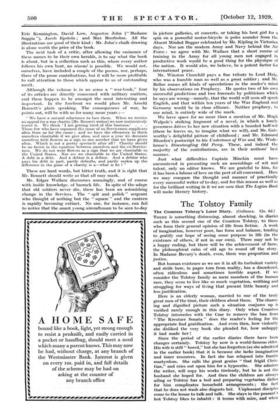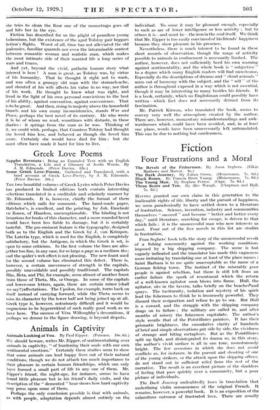The Tolstoy Family
The Countess Tolstoy's Later Diary. (Gollanez. 12s. 6d.) THERE is something distressing, almost shocking, in diaries such as this second one of the Countess Tolstoy, to those who form their general opinion of life from fiction. A work of imagination, however poor, has form and balance, tending to gratify our hope of seeing some purpose in life (in the existence of others, if not in our own). There may not be a happy ending, but there will be the achievement of fame, the philosophical calm of old age to round off the story. In Madame Bovary's death, even, there was proportion and justice.
But human existence as we see it in all its turbulent variety and strife here, in pages torn from reality, has a disordered, often ridiculous and sometimes terrible aspect. If we consider the Tolstoy family as mere members of the human race, they seem to live like so much vegetation, writhing and struggling for ways of living that present little beauty and less justification.
Here is an elderly woman, married to one of the truly great men of the time, their children about them. The charm- ing and dignified picture such a situation conjures up is verified rarely enough in this diary. Only when Countess Tolstoy intercedes with the Czar to remove the ban from " The Kreutzer Sonata " does the reader's feeling for the appropriate find gratification. And even then, how violently she disliked the very book she pleaded for, how unhappy it had made her
Since the period of the earlier diaries there have been changes certainly. Tolstoy by now is a world-famous elder. His wife is still " bored," but she has forgotten (as she admitted in the earlier book) that it is because she lacks imagination and inner resources. In fact she has relapsed into frantic martyrdom. She calls :the great genius " that frigid Chris- tian," and cries out upon him for a hypocrite. She admires the writer, will copy his works tirelessly, but he is not the husband she hoped for. And then the children are always ailing or Tolstoy has a boil and preparing vegetarian dishes kir him complicates household arrangements ; the fact that he does not wash also disgusts her. Unpleasant disciples come to the house to talk and talk. She stays in the peasant's hut Tolstoy likes to inhabit : it teems with' mice, and when she- tries to clean the floor one- of- the mousetraps goes off and hits her in the eye.
Fiction has described for us the plight of penniless young bohemians, but the existence of the aged Tolstoy pair beggars fiction's flights. Worst of all, time has not alleviated the old jealousies, familiar quarrels nor even the interminable contest between romantic woman and realistic man, which makes the most intimate side of their married life a long series of wars and truces.
And yet, beyond the vivid, pathetic human story what interest is here ! A man is great, as Tolstoy was, by virtue of his humanity. That he thought it right not to wash, and was often a grumpy old man with the stomach-ache, and shouted at his wife affects his value in no way, nor that of his work. He thought he knew what was right, and lived in the light of his own personal convictions to the best of his ability, against convention, against convenience. That is to be great. And then, rising in majesty above the household brawls and his own many inconsistencies, stands War and Peace, perhaps the best novel of its century. He who wrote it is he of whom we read, sometimes with distaste, in these diaries : it springs from the man as he was. Thinking of it, we could wish, perhaps, that Countess Tolstoy had thought she loved him less, and behaved as though she loved him more. Certainly she would have died for him : but she must often have made it hard for him to live.









































 Previous page
Previous page